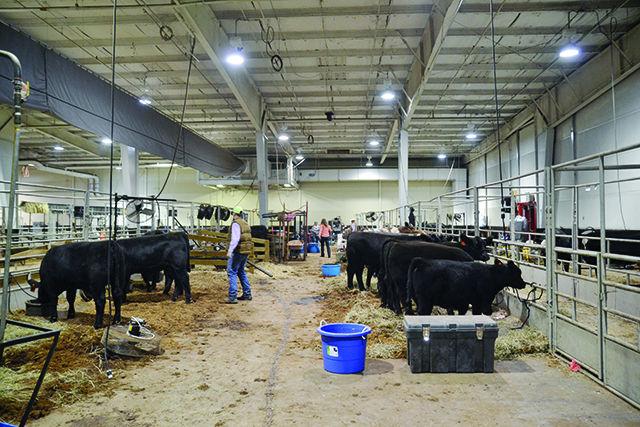
Victoria Crocker
The North Carolina State University Agricultural Department showcased cows from all over North Carolina's farms at the NC State Fair. They're housed in one of the buildings at the fairgrounds for the annual event and help teach about agriculture in today's society.
NC State 4-H Youth Livestock Program competed in the NC State Fair livestock competitions this past week with eight genetically modified sheep.
The sheep, called Polled Dorset sheep, are a breed that was created by NC State researchers in the 1950s. The sheep were modified from a genetic mutation in the flock of purebred Horned Dorset sheep. After careful research and testing to ensure the new breed of sheep carried the same characteristics of Horned Dorsets, the new strain was officially accepted into U.S. registry in 1956.
These genetically modified sheep won the Shepherd’s Award for being the best kept sheep and cleanest area. In addition to the Shepherd’s Award, the genetically modified sheep led NC State to first place in one of their class competitions, winning them $75.
NC State brought out eight dorset sheep and showed them in the open show, where three students participated and showed them off. The sheep category is just one of the 28 specific livestock competitions that take place during the North Carolina State Fair.
Gabby Garrison, a senior studying agriculture science, explained how much work showcasing the sheep took.
“Time management, responsibility, trying to manage livestock judging with classes and getting the sheep ready has been crazy,” Garrison said.
Brandon Roper, an NC State alumnus and 4-H mentor, explained what the students had to do to prepare the dorsets for the show. The preparation process includes working the animals, meaning the masters take them out and set them up in the ring. They have to touch the sheep so they will get them used to people handling them. Masters get them to put their feet down where they want them to and teach them how to walk by carrying their head around and washing them.
Roper said they sheared the sheep all off and clipped them for the show Sunday afternoon. Tuesday judges started exhibiting and had classified several of the dorsets at the top of their class.
Competitors in the show came from all over the state, as well as parts of Virginia. However, winners who reside in North Carolina receive double the amount of prize money than winning out-of-state participants.
Garrison said she expected to have a tough competition, but NC State overcame the odds and did better than expected. They plan on using the money they won to purchase more show supplies and pay entry fees for future shows, so it’ll go back to the show program.
Allison Batten, a senior studying agricultural science, explained how agriculture has been an important aspect throughout her life.
“I have been fortunate to grow up in an agricultural county, I grew up at a dead-end road, on a farm and that was the most agriculture I had growing up, until I joined FFA in high school,” Batten said. “One of my friends was showing cows, and I got into it with him and you make a lot of friends through it, you meet a lot of people and see a lot of opportunities when you come out to shows like this.”
Although the fair has become known for its rides and fried food, Batten emphasized the historical significance of agriculture at the fair.
“The North Carolina fair was founded on agriculture, and a lot of people who come out here don’t know anything about agriculture, so it is good to see this side of it and learn to appreciate it and learn that’s where your food comes from, and where your clothes come from and just be able to appreciate it more, because it’s a huge industry,” Batten said. “This is how the state fair started.